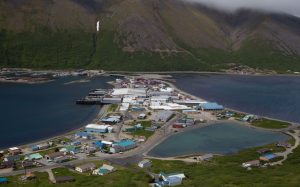Investment in Peter Pan Seafood Ends in Financial Loss and Economic Struggles
 Alaska’s Permanent Fund trustees invested over $29 million in Peter Pan Seafood, a seafood processing company in King Cove, Alaska, as part of an effort to support local businesses. However, the company shut down, leading to financial losses for the state and economic hardship for the community.
Alaska’s Permanent Fund trustees invested over $29 million in Peter Pan Seafood, a seafood processing company in King Cove, Alaska, as part of an effort to support local businesses. However, the company shut down, leading to financial losses for the state and economic hardship for the community.
The Permanent Fund, valued at approximately $80 billion, is a crucial part of Alaska’s economy. It provides annual dividends to residents and helps fund public services. Traditionally, the fund has focused on investments in global markets, but in recent years, state leaders have pushed to use the fund to support Alaska-based businesses. Peter Pan Seafood became one of the major investments under this new strategy.
Peter Pan Seafood had a long history in King Cove, where its seafood processing plant was a primary source of employment. However, in recent years, the company faced increasing financial difficulties due to aging infrastructure, rising operational costs, and shifting seafood markets. In 2021, McKinley Capital Management, an Anchorage-based firm, helped arrange the acquisition of Peter Pan Seafood using funds from the Alaska Permanent Fund. With limited experience in private equity and corporate restructuring, this raises concerns about whether the investment was properly vetted.
Rodger May, an entrepreneur with previous experience in the seafood industry, was brought in to help turn the company around. May had been involved in other seafood businesses in the past, some of which had faced legal and financial difficulties. Despite efforts to improve operations, Peter Pan Seafood’s financial troubles continued.
In early 2024, Peter Pan Seafood announced it would not be operating during the upcoming fishing season. The company shut down its King Cove plant, along with other locations, and laid off workers. This left King Cove, a remote community with few other economic opportunities, in a difficult position. Many residents relied on jobs at Peter Pan for their livelihoods, and the plant closure also impacted the city’s tax revenue.
With the company no longer operating, questions have arisen about the decision to invest state funds in a struggling business. Some critics argue that the risks of the seafood industry, combined with Peter Pan Seafood’s financial condition at the time of the investment, should have been clear warning signs. Others say the state needs a better approach to investing in local businesses to ensure long-term success.
The situation has led to broader discussions about the role of the Permanent Fund in supporting Alaska’s economy. While some state leaders believe the fund should invest more in local industries, others caution that such investments must be carefully evaluated to avoid similar failures.
As Alaska assesses the impact of the Peter Pan Seafood closure, state officials may need to reconsider how public funds are used to support businesses. This case highlights the challenges of government-backed investments and the need for research, expertise, and thorough planning when using public money for local industries.
For now, King Cove residents face uncertainty as they adjust to the loss of their largest employer. The city is looking for ways to replace the lost jobs and revenue, but options remain limited. The long-term consequences of the failed investment will continue to unfold as the state and community work through the economic aftermath.
 Maritime Injury Law Blog
Maritime Injury Law Blog

